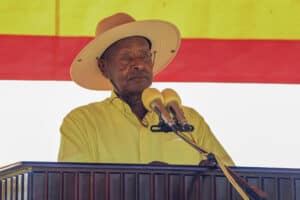South Africa's local government challenges loom over the May election, risking voter dissatisfaction amid municipal failures.

The visible challenges within South Africa’s local government are poised to cast a long shadow over the general election on 29 May, as people grapple with the failure of deteriorating municipalities.
Lance Joel, chief of operations at the South African Local Government Association (Salga), warned the issues would probably become a pivotal factor in priorities considered by voters.

LIVE interactive map, latest news, multimedia and more!
View MapALSO READ: Rand Water’s hardline: Utility reduces flow to defaulting municipalities
Dysfunction in municipalities caused by mismanagement, maladministration and political instability has exacerbated the failure of local governments to provide services to communities and businesses.
Joel said citizens, who continued to bear the brunt of poor local governance and service delivery, could leverage the elections as a way to garner attention.
“Communities often do not distinguish between the different governments, so while it may not be a local election, the dissatisfaction with municipal service delivery and local government issues are going to find expression,” Joel said.
“When political parties are on the campaign trail, communities draw attention to not receiving basic services and they must respond to that.”
Of the 80 coalition municipalities, only 50 are stable and 32 in the bigger cities and metros are distressed, he said.
“Government is three spheres, and we need to relook at how we can prioritise efficient local government.
One size does not fit all
“If we want to turn around dysfunctional municipalities, it has to start with accepting municipalities are not the same – and because they are different, we can’t use a one-size approach,” Joel said.
“We must first understand the difficulties they experience so the solution is specific to the needs and challenges of that municipality.”
Many municipalities had weathered service delivery protests tied to leadership contestation and financial strains.
The daily service delivery protests have centred on dissatisfaction and demands for municipalities to respond to community needs.
Sfiso Mbele, a resident of the Diepkloof hostel, where violent protests broke out in 2023, said taking to the streets was the only way to have their needs met.
“We believe elections are our chance to get our voices heard,” he said.
“We live among dire circumstances of not having electricity and proper sanitation.
“The hostel has been here since almost 1959 and yet we still lack the basic services in a democratic South Africa,” Mbele said.
ALSO READ: Closed valve did not cause water crisis, says Johannesburg Water
According to a group of residents from Protea South, Soweto, who embarked on a march to the city’s housing department on Tuesday, the government lacked care.
The residents held placards vowing to stay away from the polls if their housing concerns were not addressed. “It has been 30 years and we have been trying to fix the issue regarding our title deeds,” said one of them, Prince Dlamini.
“We need the government to intervene and treat this matter with the urgency it deserves.”
The Auditor-General South Africa revealed that 268 material irregularities in the 2022-23 municipal audits under the Municipal Finance Management Act amounted to an estimated value of R5.19 billion.
These were in relation to procurement and payments, resource management, revenue management and interest and penalties.
Dr Harlan Cloete, researcher at the University of the Free State, said local government was in major trouble and it appeared there was no solution in sight.
He said local government was crippled by poor governance, lack of skills and capacity and consequence management, which hindered the effective delivery of services.
No shortage of challenges
“The evidence is there that we are not doing well in terms of local government,” he said.
“The biggest issue we are seeing in the municipalities is governance.
“We often see inadequate skills and capacity at an administrative level, or a shortage of skills and capacity at a political level.
“The lack of accountability and consequence has created a social distance between communities and municipalities in terms of administrators and politicians who are not accounting to local communities in effective ways.”
ALSO READ: ANC and EFF bicker over auditor-general’s report on Ekurhuleni’s finances
Challenges of financial and administrative resources, financial management, infrastructure and lack of implementing human resource development initiatives further posed a problem to the effective functioning of municipalities.
Cloete added the build-up to the elections and what happened afterwards would offer insight and lessons into the local elections in 2026.
“Beyond the general election, communities will have 2026 to elect their representatives,” Cloete said.
“The problem is that communities have left the business of politics to politicians, but people need to be active citizens [when it relates to] what goes on in their communities.”






